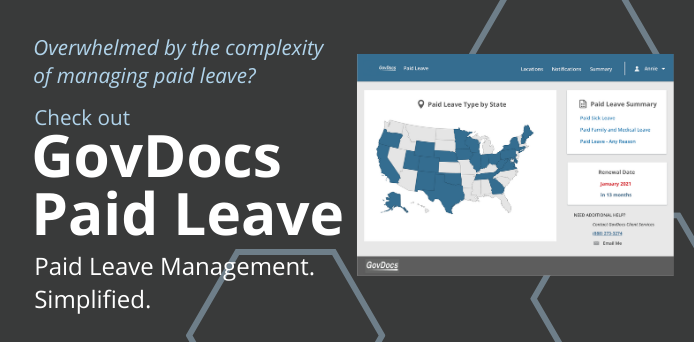EMPLOYMENT LAW NEWS
Lactation Break Laws: Federal and State
By Jana Bjorklund, GovDocs Senior Counsel and Director, Employment Law and Compliance
Published Sept. 23, 2021

As with most employment laws, complying with the variety of lactation break laws is challenging.
What lactation break laws require employers to provide workers with breaks to express breastmilk?
While there are federal requirements regarding lactation breaks, many states have their own laws for employers to monitor, as well. As these laws establish, a restroom or bathroom stall is not a sufficient area for this type of break.
Following are the variety of laws employers must be aware of to comply with federal and state lactation break requirements.
Federal Lactation Break Requirements
Employers who are covered under the Fair Labor Standards Act must comply with the Patient Protection and Affordable Care Act, which requires employers to provide non-exempt employees for one year after childbirth with a reasonable unpaid break time to express breastmilk each time she needs to do so.
Although the federal law does not require employers to provide exempt employees with these breaks, the U.S. Department of Labor (DOL) encourages employers to do so.
Employers must provide a location shielded from view and free from intrusion by coworkers or the public. A bathroom is not a sufficient location.
Additional information can be found in the DOL Fact Sheet #73 and the FAQs on Break Time for Nursing Mothers.
Webinar: Gimme a Break – How to Comply with Meal and Rest Break Laws
State Lactation Break Laws Vary and Broaden the Requirements
While there are some similarities across the states regarding lactation breaks, each state that has these requirements has a different tweak to its law.
Employers must also comply with these state laws, which are more generous than the federal requirements, if they have business locations in these states.
California
In California, employers generally must provide a reasonable amount of time to allow an employee to express breastmilk for their infant.
The time may run concurrently with other paid break time. Otherwise, if it does not run concurrently with another paid break, the time is unpaid.
California employers need to provide a lactation room that is safe, clean, free from hazardous materials, contains a surface for a breast pump and personal items, includes a place for the employee to sit, and has electrical outlets or devices allowing access to the electricity needed to operate a breast pump.
Employers with fewer than 50 employees may qualify for an exemption if they can establish that providing this break would cause the employer significant difficulty or expense in relation to their size, financial resources, and nature or structure of the employer’s business.
Paid Leave Management. Simplified.
District of Columbia
Private employers in Washington, D.C., must provide employees a reasonable amount of unpaid break time daily to express breastmilk for their infant.
Under the D.C. law, employers may require workers to use other available break time for their lactation break. The employer must provide a sanitary room or other location near the employee’s work area (including a childcare facility in close proximity to the employee’s work location), where an employee can express breast milk in privacy and security. A bathroom or toilet stall is not a sufficient location.
Employers may qualify for an exemption if providing lactation breaks to employees would cause an undue hardship on the employer’s operations.
Georgia
Private employers in Georgia must provide a paid break (at the employee’s regular rate of pay) of reasonable duration for an employee to express breastmilk in a location that provides privacy, other than a restroom. The break must be during work hours at the employee’s worksite.
Exempt employees cannot be required to use paid leave to offset these breaks and employers cannot reduce salaried employees’ compensation for taking lactation breaks.
Private employers with 49 or fewer employees may be exempt from these requirements if they can establish providing a lactation break to employees would impose an undue hardship – one that causes significant difficulty or expense in relation to the employer’s size, financial resources or nature and structure of the employer’s business.
Hawaii
In Hawaii, private employers must provide reasonable lactation breaks to employees for one year after childbirth. They need to provide a location shielded from view and free from intrusion from coworkers and the public to express breastmilk. A restroom is not sufficient.
In addition, covered employers must post a notice in a conspicuous place accessible to employees to inform them of their rights under this law.
Employers with less than 20 employees may be exempt from these requirements if they can show providing lactation breaks would pose an undue hardship by causing employer significant difficulty or expense in relation to the size, financial resources, and nature or structure of the employer’s business.
Labor Law Poster Management. Simplified.
Minnesota
Minnesota private employers must provide reasonable unpaid lactation breaks each day to employees who need to express breastmilk for an infant child.
The break time must run concurrently with other break time provided to the employee if possible.
Employers must make reasonable efforts to provide a room or location near the employee’s work area with access to an electrical outlet where the employee can express breastmilk in privacy. It must be shielded from view and intrusion from coworkers or the public. A restroom or toilet stall is not sufficient.
Employers are not required to provide this lactation break time if it would unduly disrupt the employer’s operations.
Mississippi
Mississippi private employers must allow employees to use meal or break periods to express breastmilk.
Nevada
 Private employers must provide employees with an infant under 1 year of age with reasonable break time to express breastmilk as needed.
Private employers must provide employees with an infant under 1 year of age with reasonable break time to express breastmilk as needed.
They must provide a location reasonably free from dirt or pollution that is also protected from the view and intrusion of others. A bathroom is not a sufficient location.
If an employer determines that complying with these requirements would cause an undue hardship, the employer may meet with the employee to arrange for a reasonable alternative. If the employer and employee cannot agree on an alternative, the employer may require the employee to accept a reasonable alternative selected by the employer.
Employers are prohibited from retaliating against any employee for taking lactation breaks consistent under the law or for taking action to require the employer to comply with the law.
Small employers with less than 50 workers may be exempt from these requirements if they would impose an undue hardship on the employer.
New Jersey
In New Jersey, a private employer must provide reasonable accommodation for needs related to an employee’s pregnancy when the employee requests the accommodation based on the advice of her physician.
For employees breastfeeding an infant child, the accommodation must include reasonable break time daily in a suitable room with privacy close to the work area. A restroom or toilet stall is not sufficient.
New York
Private employers in New York State must provide employees reasonable unpaid break time or permit nursing employees to use paid break time daily to express breastmilk for up to three years following the birth of their child.
Employers must make reasonable efforts to provide a room near the employee’s work area where they can express breastmilk in privacy.
Meanwhile, employers in New York City with at least four employees must provide lactation rooms and refrigerators in reasonable proximity to work areas for employees to express and store breast milk. They must also implement a written lactation room accommodation policy and distribute it to all new employees.
Oregon
Oregon employers must provide a reasonable unpaid lactation breaks to employees who are breastfeeding a child 18 months of age or younger. If possible, employees must take lactation breaks at the same time as other rest periods or meal breaks.
Employers must make a reasonable effort to provide a private location for the break, close to the employee’s work area. A restroom or toilet stall is not sufficient.
If an employee’s regular job duties do not allow for expressing milk, an employer may allow an employee to change job duties temporarily.
Although lactation rest breaks are unpaid, Oregon employers may need to consider these breaks as paid breaks or hours worked if required by law or contract, or if the employer’s contribution to an employee’s health insurance is influenced by the number of hours the employee works.
Employees must provide the employer with reasonable notice of their need for a lactation break, when possible. Note, though, that an employee’s failure to give notice is not grounds for discipline.
Employers with 10 or fewer employees may be exempt from these requirements if it would impose significant difficulty or expense in relation to the employer’s size, financial resources, and nature or structure of their business.
South Carolina
In South Carolina, private and public employers with one or more employees are subject to the Lactation Support Act, which requires employers to provide unpaid lactation breaks.
If possible, the break must run concurrently with any break time provided to the employee. Employees must make a reasonable effort to minimize any disruption to the employer’s operations.
Employers are required to make reasonable efforts to provide a private room or location near the work area, but they do not have to build a room for the primary purpose of expressing breastmilk. A bathroom stall, however, is not sufficient.
Employers are prohibited from discriminating against employees who exercise their rights under this law.
Again, employers may be exempt from these requirements if providing this break time would create an undue hardship on the operations of the employer.
Tennessee
Private employers in Tennessee are required to provide a reasonable unpaid break daily to employees who need to express breastmilk for an infant, unless doing so would unduly disrupt the employer’s operations. The break time must run concurrently with other break time provided to the employee.
Employers must make a reasonable effort to provide a room or location near the work area where an employee can express breastmilk in private. A bathroom stall is not sufficient.
Conclusion
As with most employment laws, complying with the variety of lactation break laws is challenging.
To ensure compliance, employers should understand the federal requirements and take note of the specific state requirements for any state listed above where they maintain operations.
This Employment Law News blog is intended for market awareness only, it is not to be used for legal advice or counsel.
Keep Informed
with GovDocs Employment Law News
Learn More About GovDocs
What is GovDocs?
GovDocs simplifies employment law compliance for large, multi-jurisdiction employers in the U.S. and Canada. The GovDocs software platform integrates three solutions in one convenient place to help you master the employment laws impacting your business. Whether you manage a postings, minimum wage or paid leave program, our products cut through research time, provide proactive insights into the everchanging landscape of employment laws and reduce the risk of noncompliance. The company is headquartered in St. Paul, Minn.
Have fewer than 30 locations?
The GovDocs Poster Store simplifies posting compliance for employers with less than 30 locations across all industries, offering a variety of posting products to meet your labor law compliance needs.




